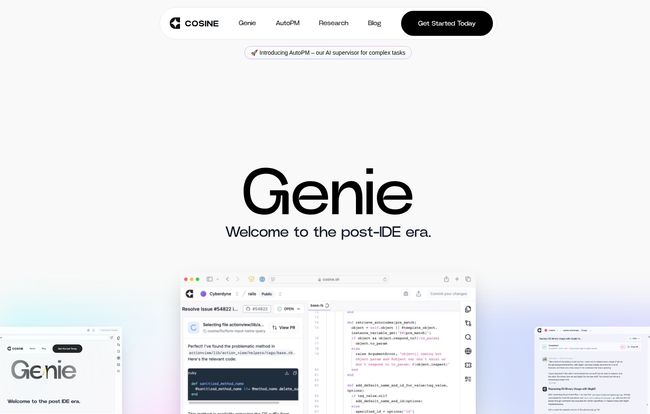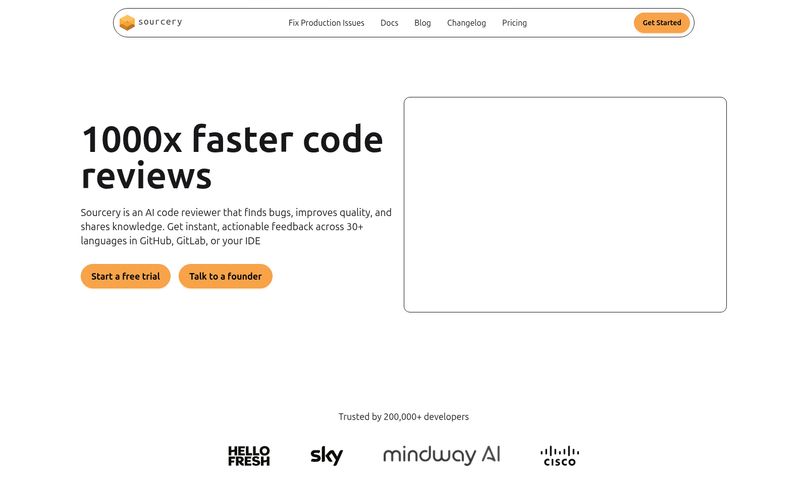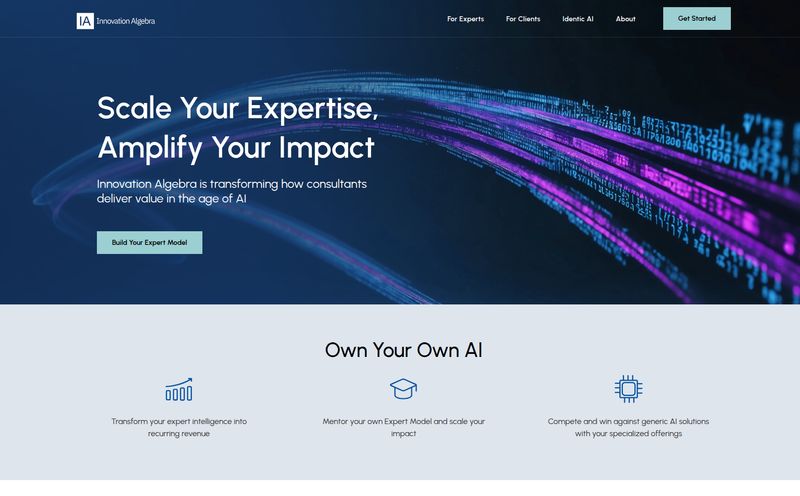We’ve all been there. Staring at a monolithic codebase you inherited, trying to find where that one, single god-forsaken function is defined. It feels like digital archaeology, and you're the one without a map. The onboarding process for new devs is a nightmare of wiki pages, long-winded explanations, and the classic, “Oh, just ask Dave… if he’s not on vacation.” For years, the IDE (Integrated Development Environment) has been our trusty command center, but it's still fundamentally a passive tool. It helps us write and debug, but it doesn't understand.
Then a company like Cosine comes along and starts throwing around phrases like “Welcome to the post-IDE era.”
My first reaction? A healthy dose of skepticism. We’ve seen hype cycles come and go in the dev world. But my curiosity got the better of me. They’re not talking about a better autocomplete or a smarter linter. They’re talking about Genie, an AI that they call a “software engineer.” A bold claim. But what if they're even partially right?
So, What Exactly is Cosine's Genie?
Forget what you know about basic AI coding assistants. This isn't just about suggesting the next line of code, like a glorified predictive text. Genie is positioned as an active agent, a collaborator. Think of it less like a tool and more like a tireless, incredibly fast junior developer who has already memorized your entire project, front to back. A dev who doesn't need coffee and never gets tired of refactoring legacy code. Sounds pretty good, right?
The core idea is that Genie has a deep, contextual understanding of your entire codebase. Not just the file you have open, but the whole tangled web of dependencies, classes, and ancient scripts no one has dared touch in years. With support for over 50 programming languages, it's designed to be language-agnostic. It can parse through your Python backend, your React frontend, and the weird Bash script holding it all together. This comprehensive view is what supposedly allows it to move beyond simple suggestions into actual autonomous work.

Visit Cosine AI
The Features That Made Me Look Twice
Okay, the marketing sounds great. But as an SEO and someone who's waded through enough tech to fill a data center, I look for the substance. What can it actually do? Cosine breaks it down into a few key areas that are, I have to admit, pretty compelling.
Fully Autonomous Task Execution
This is the big one. The idea that you can assign Genie a task—like “fix the authentication bug reported in ticket #5821” or “add a new sorting option to the user dashboard”—and it will just… do it. The workflow they show involves Genie finding the context, proposing code changes, and then verifying them. It’s like delegating to a team member. You're not micromanaging the keystrokes; you're defining the outcome. If this works as advertised, it could genuinely change how teams tackle backlogs and technical debt.
The Dream of Real-time Collaborative Coding
We've all done pair programming. It can be amazing for solving tough problems, but it's also a huge time sink, requiring two developers to sync up. Genie offers a different model: an AI pair programmer that's always available. It provides instant feedback and can work alongside you, a concept they call “real-time collaborative coding.” Imagine you’re working on a new feature, and you can just ask your AI partner to simultaneously write the unit tests for it. That's a powerful proposition, moving from a turn-based coding process to a parallel one.
Native Integration into Your Workflow
Here’s where they won me over a little. My biggest fear with new, powerful tools is that they require you to completely change how you work. Nobody wants that. Cosine seems to get this. They say you should give Genie “the highest value tasks you’d send a colleague to help with.” This framing is smart. It’s not about replacing your IDE or your Git client. It's about adding a new resource to your team that integrates with your existing flow of assigning and reviewing work.
The Good, The Bad, and The Codebase
No tool is perfect. Let's get real and look at the pros and the potential cons, based on their own documentation and the realities of software development.
The Upside I'm Genuinely Excited About
The main advantage is speed, plain and simple. Reducing the time it takes to onboard new developers by giving them an AI that can answer any question about the codebase is massive. Automating routine tasks like writing tests, refactoring code, or fixing straightforward bugs could free up senior developers to focus on architecture and innovation—the stuff that actually drives a business forward. It's a force multiplier for your existing team.
The Reality Check and Potential Hurdles
Okay, let's ground ourselves. The first hurdle is that a tool this powerful will almost certainly have a learning curve. It’s not a simple plugin. Second, its performance is going to be heavily dependent on the quality and complexity of your existing codebase. I imagine on a clean, well-documented project, Genie would be spectacular. On a decade-old spaghetti-code monolith? The results might be… less predictable. There's also the initial setup and integration, which could be a project in itself for larger organizations. You can't just expect to flip a switch and have an AI engineer ready to go. It will require some investment.
So, What's the Price for an AI Teammate?
This is the million-dollar question, isn't it? As of writing this, Cosine hasn't published a public pricing page for Genie. This usually means one of two things: it's either aimed at enterprise clients with custom pricing, or they're still finalizing their go-to-market strategy. My guess is the former.
However, they do offer a free trial, which is the best way to see if it’s a fit for your team. Even more interesting for the dev community, they point to an open-source repository on systeminc.now, encouraging people to try it on an open-source codebase. This transparency is a good look, it shows confidence in their product and a willingness to engage with the community.
Is This Really the End of The IDE?
So, back to the original, provocative claim: the “post-IDE era.” Is it here? No, I don't think so. Not in the sense that we'll all be uninstalling VS Code or JetBrains tomorrow.
But I think the role of the IDE is changing. It's becoming the dashboard, the cockpit—while AI agents like Genie are becoming the engine and the autopilot. The IDE is where we'll oversee the work, review the changes, and make the final strategic decisions. The AI is the one doing the heavy lifting in the background. So, not a “post-IDE” era, but perhaps a “co-pilot” era. Or maybe an “AI-augmented” era. It doesn't roll off the tongue quite as well, but it feels a lot more accurate.
I'm genuinely intrigued by Cosine AI's Genie. It’s one of the first tools I’ve seen that feels like it’s thinking about the problem at the right level—not just as a code writer, but as a problem solver. I'll be keeping a close eye on this one. You probably should to.
Frequently Asked Questions
- What is Cosine AI Genie?
- Genie is an AI software engineer developed by Cosine. It's designed to understand entire codebases, autonomously execute tasks like bug fixes and feature implementation, and collaborate with developers in real-time.
- What programming languages does Genie support?
- Genie supports over 50 different programming languages, making it suitable for a wide variety of projects and tech stacks, including both frontend and backend development.
- How does Genie integrate with my existing tools?
- Genie is designed for native workflow integration. The idea is to delegate tasks to it much like you would a human colleague, fitting into your existing project management and version control systems rather than forcing you to adopt a whole new environment.
- Is Cosine AI Genie free to use?
- While there isn't a public pricing plan, Cosine offers a free trial to test Genie's capabilities. They also provide access to an open-source repository for experimentation.
- How is Genie different from GitHub Copilot?
- GitHub Copilot primarily functions as an AI pair programmer that suggests code snippets and completes lines as you type. Genie aims to be more of an autonomous agent; you can assign it a complete task (e.g., "implement this feature"), and it will handle the entire process of finding files, writing code, and verifying changes.
- Can Genie work on complex, legacy codebases?
- While it's designed to understand complex code, its performance may vary. The tool's effectiveness can depend on the structure and clarity of the codebase. It's recommended to use the free trial to test it on your specific project.



